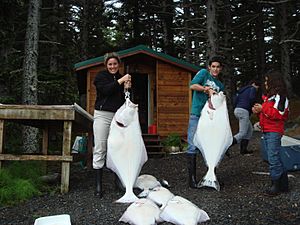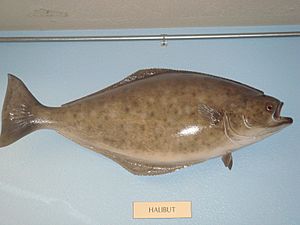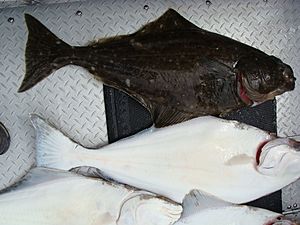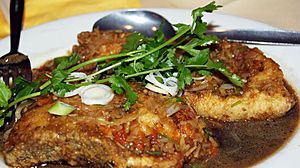Halibut facts for kids
Halibut are a type of flatfish. People often eat them as food. These fish live in the North Atlantic and North Pacific oceans. They prefer to live in warm waters. Sadly, Atlantic halibut have been overfished. This means too many have been caught, and they might disappear forever.
The name "halibut" comes from two old words. "Haly" means holy, and "butt" means flat fish. People used to eat them on Catholic holy days.
What Halibut Look Like
The Pacific halibut is the biggest flatfish in the world. One huge halibut caught in Norway in 2013 weighed 515 pounds and was 8.6 feet long! Another large one, weighing 482 pounds, was caught in Alaska in 2014.
Halibut are dark brown on their top side. Their belly is an off-white color. They have very tiny scales on their skin that you can't see easily. When halibut are born, they look like other fish. They have one eye on each side of their head. But about six months later, something amazing happens. One eye moves to the other side of their head!
After this, the side with both eyes turns dark brown. This matches their top side. The other side stays white. This special coloring helps them hide. When seen from above, they blend with the ocean floor. When seen from below, they blend with the light from the sky. This type of hiding is called countershading.

What Halibut Eat
Halibut eat almost any fish or animal they can fit into their mouths. Young halibut eat small crustaceans and other tiny creatures that live on the ocean floor.
Adult halibut eat many different animals. These include sand lance, octopus, crab, salmon, hermit crabs, lamprey, sculpin, cod, pollock, herring, and flounder. They even eat other halibut!
Halibut live at different depths, from shallow waters to hundreds of meters deep. They usually stay near the bottom. But they can swim up into the water column to find food. In most ocean areas, halibut are near the top of the marine food chain. In the North Pacific, their main predators are sea lions, killer whales, salmon sharks, and humans.
Halibut as Food

People often boil, deep-fry, or grill fresh halibut. Smoking halibut meat is harder than smoking salmon. This is because halibut has very little fat. When eaten fresh, halibut meat has a clean taste. It doesn't need much seasoning. Halibut is known for its firm and dense texture.
For a long time, halibut has been an important food for Alaska Natives and Canadian First Nations people. It is still a key part of how many coastal communities get their food. It can be a challenge to make sure everyone, including commercial fishermen, sport fishermen, and local communities, can catch enough halibut.
Images for kids
-
Fishermen in Seward, Alaska with a fresh catch of halibut
-
Filleting a Pacific halibut taken in Cook Inlet, Alaska. A halibut yields four large fillets, with the yield percentage higher than for most fish. Round halibut cheeks may provide additional meat
See also
 In Spanish: Halibut para niños
In Spanish: Halibut para niños
 | Aaron Henry |
 | T. R. M. Howard |
 | Jesse Jackson |







